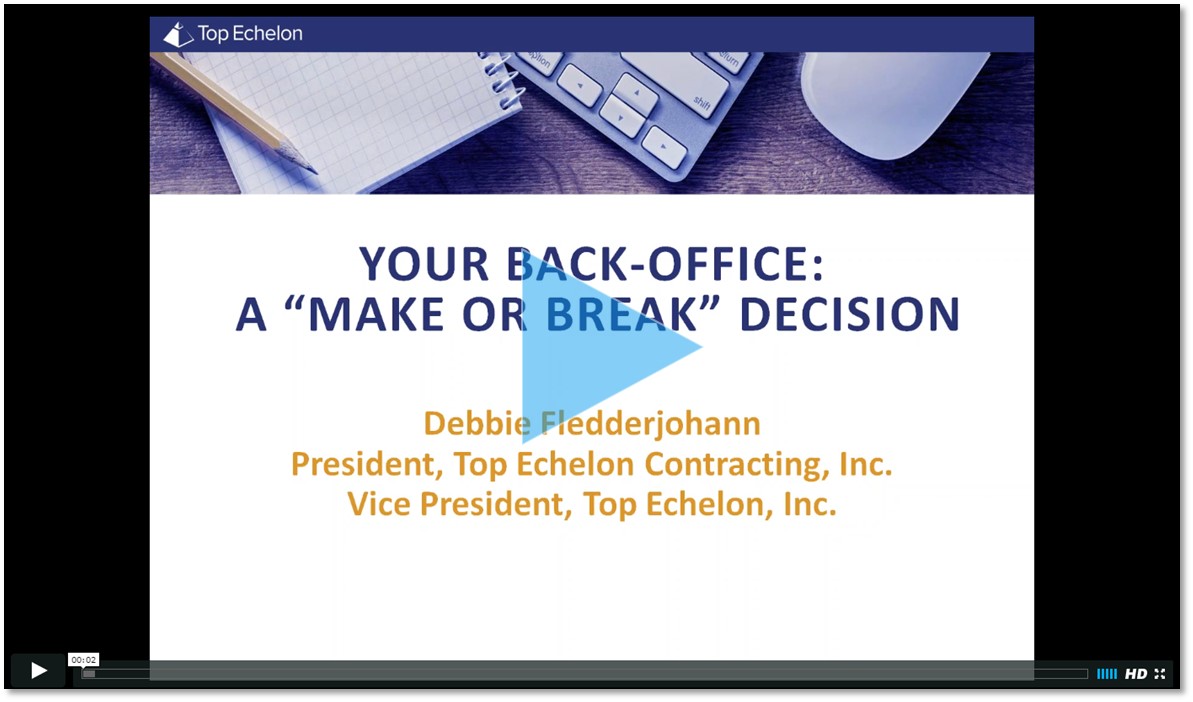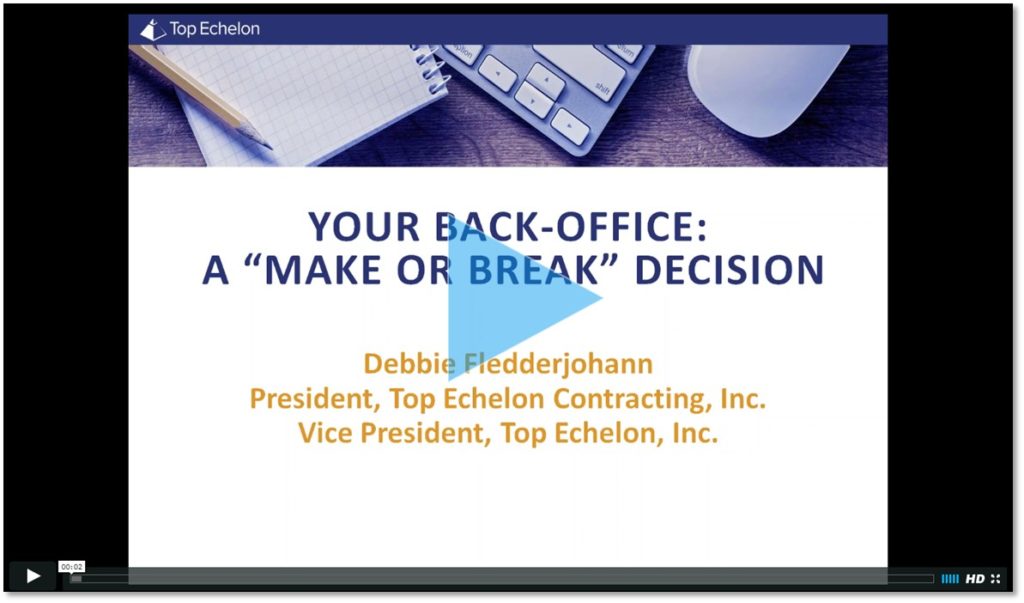The recruiting landscape has shifted, and contract staffing is here to stay. Recruiters, you’re already experienced with getting job orders and finding candidates. The only unknown part of contract staffing is how you handle the actual mechanics of employing contract workers. So what should you do? You have an important decision to make. Your options:
- Handle the employment tasks in-house.
- Outsource the employment tasks to a back-office.
This decision can make or break your business. The requirements facing employers are growing larger by the day, and missteps because “you don’t know what you don’t know” can have serious consequences.
TEC President Talks “Back Office Operations”
Debbie Fledderjohann, who has been the President of back-office Top Echelon Contracting, Inc. for the last 22 years, recently addressed these very issues in a 30-minute webinar. She talked about both the in-house mechanics of handling employment tasks and the key questions to ask potential back-office providers if you decide to outsource. In this recap, we take a look at the first part of her presentation–going the in-house route.
Handling Payroll Funding
The first thing you will need to figure out is how you will fund the payroll. Fledderjohann described three possibilities:
- Self-funding. This is generally the preferred option, because you don’t have to pay any fees or contend with any debt. However, you do have to have a large sum of cash available up-front.
- Taking out a line of credit. This option typically involves taking out loans against hard assets such as a home or other property. This option is usually only viable for larger, more established firms.
- Using a payroll funding/factoring company. With this option, you lend funds against your accounts receivable. However, it is common for these companies to take a percentage of the invoice as their fee.
When considering any of these options, you need to be sure you have a plan in place for if/when clients stop paying invoices. Government laws require that employees be paid regularly and consistently, so there will be times when you will need to “float” payroll to your contractors and you will not yet have been paid by the client.
Collecting Timesheets and Processing Payroll
Fledderjohann discussed these main things to determine the mechanics of timesheets and payroll:
- What type of timesheet will you be using – online or paper?
- How will you get client authorization on contractor timesheets?
- How will you track and collect missing timesheets?
- Which payroll system will you use, and will it interface with your timesheet system?
- How will you handle expense reimbursements, and are you familiar with the IRS guidelines for doing so?
- Who will run the payroll on a weekly or bi-weekly basis?
- Who will file the taxes? Weekly, monthly, quarterly, yearly?
She also noted the importance of having a back-up plan in place, since delays and mistakes can severely damage your firm’s reputation.
Invoicing and Client Collections
As Fledderjohann noted in her presentation, there are key factors to consider right at the start here:
- How are you going to verify the accuracy of your invoicing information?
- Is there a check and balance system with man hours and rates between your firm and the client?
- Which invoicing system will you use, and will it interface with your payroll system?
- How will you handle tracking, following up with, and collecting on unpaid invoices?
Do you have a plan in place for if/when you cannot collect on an invoice? What will you do? Depending on the payroll funding option you choose, this is absolutely vital. Fledderjohann also recommended running a credit check on every client prior to allowing contractors to begin work for them.
Certificate of Insurance Recommendations
Many clients will have requirements for a back-office’s Certificate of Insurance. The typical coverage includes the following:
- Commercial General Liability
- Professional Liability
- Commercial Excess Liability (Umbrella)
- Hired and Non-Owned Automobile Liability
- Employer Practices Liability Insurance (EPLI)
- Bond – Employee Dishonesty
- Bond – Employee Forgery
- Sexual Abuse
The cost of liability coverage is significant, but Fledderjohann’s experience is that clients will ask for it, and some will refuse to work with a back-office who does not have this coverage.
Federal and State Considerations for Employers
Every employer in every state has to handle the following:
- Withhold the FICA taxes: Social Security at 6.2% and Medicare at 1.45%
- Pay the employer portion of those taxes
- Pay the Federal Unemployment Tax (FUTA)
- Withhold and file Federal income tax
At the state level, employers have to comply with a patchwork of requirements for the states in which their employees work:
- Register to do business in each state required
- Pay State Unemployment Tax (SUI)
- Withhold and file State Income Tax (SIT)
- Carry Worker’s Compensation insurance
- Comply with any applicable mandatory sick time requirements at the state, city, or county level
- Pay sales tax (if applicable)
This is a sampling of the requirements that are possible, not an exhaustive list. As the employer, it is your responsibility to research and comply with all applicable requirements in your states.
Employee Benefits Administration
In the present day, most contractors have come to expect employee benefits. As their employer, you need to think about the benefits package you will offer, if any. Consider:
- Will you offer group health insurance at group rates?
- Will your health coverage be ACA-compliant as your number of contractors grows?
- What type of package will you offer? Will it be regional or national?
- Will you offer dental, vision, life insurance, and/or disability coverage?
- Will you have a 401(k) option available?
- How much will this cost? Will you, as the employer, contribute any part of the premium(s)?
- How will you manage administration of the benefits?
Your benefits package is important. It can be the thing that attracts and retains your contractors to your firm, but it can also be a major cost and headache to administer. You’ll want to consider your options carefully and make a balanced choice.
Contracts for clients and contractors
Finally, you’ll need to put some thought (and resources) into your contracts:
- Will you have an employment agreement in place with each contractor?
- Does it discuss terms, compensation, training, location, etc.?
- Does it clearly define the employment relationship and the form of control?
- Does it address issues such as non-competes, intellectual property, etc.?
- Will you have a client services agreement in place with each end client?
- Does it establish the duties and responsibilities of each party?
- Does it document conversion fees, rates, and payment terms?
- Does it address issues such as indemnification clauses, governing law, etc.?
- What will you do when presented with a client’s own agreement?
It is key to get attorney approval on any and all contract terms. Will your agreements hold water and be legally binding? Make certain of that well in advance of entering into an agreement.
Final Recommendations
As a business, it is important to know what level of liability you are comfortable carrying, and what level you are actually carrying at any given time. Do those two match up? If you decide to run your own back-office, they may not. The Obama administration has brought more and more requirements and consequences into the already-complex employment mix. As an employer, you are responsible for compliance with any such requirements, and the government is not known for being overly forgiving of the answer “I didn’t know.” It’s vital to do your homework before diving in.
Other Options?
What if you’d rather dip your toe into the contract staffing waters, rather than diving in headfirst? Your best bet is outsourcing to a reputable back-office employer of record service. Request the webinar video today to hear Fledderjohann’s must-ask questions and considerations when selecting a back office operations provider. (Note: This article is for informational purposes only and should NOT be construed as legal advice of any kind.)
Watch the full webinar today!






